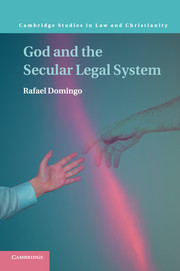
God and the Law in the Age of Secularization
Rafael Domingo
Interior Photography of Church created by freestocks.org (Pexels, CC)
Over the last few years, I have attempted to present a universal and coherent legal framework for the treatment of God, religion, and conscience by secular legal systems. This project is based on my objections to both traditional religious and current liberal approaches to religious freedom. The religious approach fails because it requires the concept of God to justify the secular legal system in a globalized and pluralistic society in which believing in God is no longer axiomatic or unquestionable. The liberal approach fails because it closes the door to Abrahamic religions―and specifically to God―by reducing God and religion to a matter of conscience. The religious approach is inevitably exclusivist, while the liberal approach is inevitably reductionist.

To offset this lack of balance, I offer a third path to conceptualizing religious freedom. I advocate for a theistically oriented conception of the secular legal system that is able to embrace nontheistic approaches. In other words, I support a secular legal system that includes God but also supports perspectives that do not include God. My argument is secular, but my approach is religious at its heart.
We can best understand the lack of X by first understanding X itself. Thus, for example, it is easier to understand nonexistence by first grasping existence than it is to do the reverse. The same goes for theism and non-theism. Thus, it is reasonable that the starting point of a comprehensive legal paradigm for religious freedom for both believers and nonbelievers should be theistic rather than nontheistic or atheistic. The risk of a nontheistic or atheistic legal approach falling into reductionism is a real one. Secular legal systems should approach God, religion, and conscience separately because each affects the legal system in a different form, dimension, and way. A secular legal system can differentiate God from religion and conscience, just as it can differentiate religion from God and conscience, as well as conscience from God and religion. In a secular legal system, these distinctions are not only achievable but reasonable and desirable as well.
God is a meta-legal concept; though the concept of God is not properly a legal concept like contract or testamentary will, it does have some legal significance. The metalegal God requires recognition by secular legal systems. This degree of recognition does not demand that the law’s recognition of God must be transformed into positive law, since God does not need legal protection. Citizens and legal documents can mention God without falling into discrimination. The existence of God does not have a legal effect in the strictest sense beyond recognition; therefore, the legal recognition of God never involves the demand that citizens make an act of faith. As a meta-legal concept, God illuminates the legal system from the outside, providing support for pillars such as dignity, equality, solidarity, and human rights. The recognition of God, therefore, does not constitute a sacrifice of democratic principles; instead, it constitutes a strong meta-legal support, even for the secular character of the legal system. Since God is on both sides of the so-called wall of separation, God is a source of social cohesion; hence, God may never be used as a political instrument. The use of coercion in the name of God has no legal justification.
As with God, religion is also a meta-legal and interpretive concept; it is translegal and suprarational, since religion transcends both the legal system and the legal reasoning. These two aspects put religion outside the secular legal system. However, unlike God, religion demands support and protection from secular legal systems. A secular legal system must protect religious rights; however, it must not regulate the content of any religion. The specific protection and support that legal systems provide to religion depends on the constitutional framework and historical circumstances of any given polity. Since the secular legal system is nonreligious by nature, it should protect religion as a special right in order to avoid becoming a structurally religious legal system. Because religion is the matter of a specific human right, it must be tolerated, not just recognized or accommodated, as with God or conscience.
The essence of the right to religion is the protection of religion by the secular legal system as a public good and social value.
The authentic act of adherence to a faith or creed is by nature completely free and personal. Faith can be shared only within a community of voluntary membership, such as the religious community, and not one of compulsory membership, such as the political community. The free “I believe” can be shared only through an equally free “We believe.” It demands unanimity, not just majority. If every human being is required to be a member of at least one political community to satisfy his or her basic needs and develop his or her personal capacities, but a compulsory political community is based on the majority principle and may not regulate transcendent things, then the existence of a dualistic structure that guarantees freedom of religion is a democratic constitutional claim. Dualism is a political principle, not a religious one. A well-ordered political community must be dualistic in order to protect both religion from politics and politics from religion. At the heart of any secular social contract is the idea that no political community should make religious truth an article of legal faith, as citizens would no longer have the required freedom to practice (or not practice) a religion. Thus, political and religious communities have different purposes, although both have been established for the sake of human beings. Political communities can share religious values, which do not require a specific act of faith, but they cannot impose a concrete religious belief as a matter of law.
The legal distinction between religion and morality leads to the idea that the so-called right to religious freedom should be understood as a right to religion. The essence of the right to religion is the protection of religion by the secular legal system as a public good and social value. Religious freedom is a necessary condition to the existence of the right to religion; however, the right to religion goes beyond freedom. It fits into the framework of the right to, such as the right to marriage or the right to education. Private religions should be legally treated as religions just by analogy. They can be treated also as morality when they are founded on a rationale.
The religious exception is a normative tool to protect the right to religion against legal intrusions in the religious domain. It is a legitimate response to resolving the tensions between the secular legal system and religious convictions. The religious exception should be recognized by the judiciary, as it is a matter of adjudication. Because secular legal systems are nonreligious (i.e., they may not invoke what I have called suprarational arguments), they should not limit the practice of religion beyond the limits of public order and public morality. The religious exception is a manifestation of the inherent power of citizens to limit the power of political authorities through the judiciary.
Secular legal systems should carefully make a distinction between God, religion, and conscience; rationality and suprarationality; private and public morality; and recognition, toleration, and accommodation.
Conscience is connected to the law through morality. Since all secular legal systems are moral by definition and conscience is individual, conscience can serve as a private limit on the legal system. It is prelegal and private, unlike religion, which is translegal and public. Hence, conscience and religion cannot receive the same treatment from secular legal systems; that would be a categorical error. The error of the old religious freedom paradigm was in failing to recognize a realm of moral conscience beyond the realm of religious conscience (i.e., in reducing morality entirely to religion). The error of the liberal approach is in failing to recognize a realm of religious conscience beyond the realm of moral conscience (i.e., in reducing religion to morality).
By protecting conscience, legal systems are protecting human dignity and, specifically, the moral integrity of the human person. Since the act of conscience belongs to the private sphere of a person’s interior life (internal forum), legal systems protect conscience by protecting freedom of conscience. There is, however, no right to conscience, as there is a right to religion; there is simply a right to freedom of conscience. The reason is that freedom of conscience does not entail the right to practice one’s own vision of morality in the public sphere. Freedom of conscience is based on the idea that the private and public dimensions of morality constitute a separable yet unwavering unity. For this reason, morality demands accommodation, not toleration, since it does not constitute a right by itself, as does religion. Accommodation can be granted by the three branches of government.
In sum, secular legal systems should carefully make a distinction between God, religion, and conscience; rationality and suprarationality; private and public morality; and recognition, toleration, and accommodation. These concepts and ideas provide a secular legal system with the keys to establishing a new, coherent constitutional framework for the protection of the rights to religion and freedom of conscience in this age of diversity, interdependence, and secularization. ♦

Rafael Domingo is the Spruill Family Professor of Law and Religion at Emory University and Alvaro d’Ors Professor of Law at the University of Navarra. He is the author of the book God and the Secular Legal System (Cambridge University Press, 2016).
Recommended Citation
Domingo, Rafael. “God and the Law in the Age of Secularization.” Canopy Forum, April 14, 2020. https://canopyforum.org/2020/04/14/god-and-the-law-in-the-age-of-secularization/

